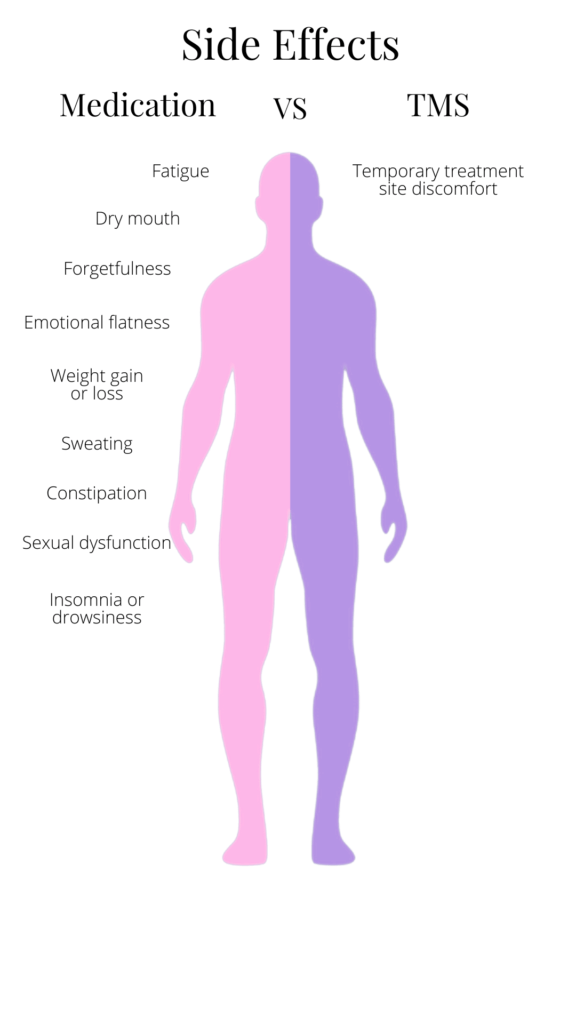For many years, the initial response to mental health treatment has been medications and talk therapy. Although these conventional treatments can be effective, they don’t work for everyone. There are effective, alternative depression treatments out there. If you’re experiencing lingering symptoms or unwanted side effects, or if you want to supplement your current treatments, transcranial magnetic stimulation (TMS), could be your next step. However, you could be left wondering, “is TMS right for me?” We are answering all of your frequently asked questions regarding this innovative treatment.
1. What is TMS?
Video Transcript: There’s currently a revolutionary treatment for depression, and if you haven’t heard about TMS you really should know about it. Everybody I treat with TMS therapy wishes they had found out about it about 10 years ago. I’ve been treating patients with TMS therapy for over a decade with amazing responses. TMS therapy stands for transcranial magnetic stimulation, and it uses gentle magnetic pulses to focally stimulate specific areas of the brain that we know aren’t working well in depression and anxiety. A nice way to think about TMS therapy is it’s like physical therapy for the brain. Unlike medications that cause intolerable side effects, we have none of that with TMS therapy. Additionally, most people feel better within about two weeks of treatment.
2. Why Choose TMS?
Unlike other treatments, TMS therapy is non-drug (no medication), non-invasive (does not require surgery), and non-systemic (does not affect the entire body). TMS is covered by most insurance and has fewer side effects than other treatments, or in some cases, no side effects at all.
TMS therapy is an FDA-cleared treatment that can be used alone or in conjunction with medication. TMS uses using gentle magnetic pulses to treat specific areas of the brain known to be under or overactive in conditions affecting mental health and cognition. Unlike medications, which affect the entire body, TMS therapy treats mental health at the source.
3. Does TMS only work for Major Depressive Disorder?
Since its FDA clearance in 2008 for major depressive disorder and 2018 for OCD and cigarette cessation, TMS is also a strong intervention for a range of other conditions affecting mental health and cognition. Notably, TMS therapy is a safe and effective treatment for anxiety, cognitive decline, and migraine.
4. How Effective is TMS?
TMS is a safe, highly effective, and FDA-cleared treatment option that is twice as effective as medication such as antidepressants. Since 2009, over 70% of Neuro Wellness Spa patients have experienced major depression symptom relief for with TMS therapy. Although many mental health conditions are chronic, TMS helps patients achieve remission. Length of remission depends on many factors including:
- Diet
- Exercise
- Therapy
- Severity of illness
- Lifestyle
The goal of mental health treatment is to achieve full remission. Patients should not tolerate lingering symptoms or unwanted side effects. TMS is an effective treatment alternative to medication and therapy that helps patients feel all the way better.
5. What to Expect During TMS Therapy?
During TMS treatment, patients recline in a private treatment room and may relax, read, work, or watch television. A TMS magnet is positioned over the patient’s head to deliver gentle magnetic pulses to stimulate specific areas of the brain. Each treatment session lasts about 20 minutes, after which patients can get back to their days right away, including work or school. Unlike medications which can take 6-8 weeks to exert their full effects, most patients notice an improvement in their depression symptoms with TMS after 2 weeks of treatment (8-10 sessions).
6. What are the Side Effects of TMS?
TMS has far fewer side effects than antidepressant medications. With more than 10,000 treatments performed in clinical trials, the most common side effect was temporary and mild headaches or scalp discomfort during active treatment. Unlike medications, which affect the entire body as they pass through the blood-brain barrier, TMS therapy treats the brain directly.

7. What’s Involved in TMS Treatment?
Video Transcript:
When patients come to the Neuro Wellness Spa for TMS therapy, they are treated in a private room. They’re seated in the MagVenture chair and reclined.
Most patients choose to relax, while some prefer to talk to the TMS technician or watch television during their session.
The magnetic coil is placed on the patient’s head, and they’ll feel gentle tapping pulses during the active treatment.
TMS therapy is well-tolerated and very effective.
Treatment Overview:
- 36 sessions in total.
- 5 times a week for 6 weeks, followed by a 6-session taper over 3 weeks.
- Each session lasts about 30 minutes.
Patients can drive themselves to and from the session and resume normal activities right away, including going to work or school.
Unlike medications that can take 4 to 6 weeks to start working, most patients feel better within about two weeks of starting TMS therapy.
If you’re struggling with depression or anxiety and not responding to medications or therapy, call Neuro Wellness Spa today to get your TMS therapy started!
8. What about insurance?
Transcranial magnetic stimulation therapy for depression is FDA-cleared and TMS is covered by most insurances including Aetna, Anthem, Blue Shield, Optum, MHN/Healthnet, Tricare, Cigna, Magellan, Beacon/Carelon, and most other commercial insurance policies.
Is TMS Therapy right for me?
Our phenomenal clinical team is always available to help prospective patients understand their insurance coverage options for our treatments. We know how important it is that those seeking help are able to get the treatment they need. Not to mention, at Neuro Wellness Spa, we handle all the paperwork. If you have tried standard treatments such as psychiatry, medication management, or psychotherpay to alleviate your depressive symptoms and have struggled to find relief, contact Neuro Wellness Spa today to find out if TMS is right for you.